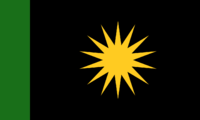Khirmania: Difference between revisions
Jump to navigation
Jump to search
No edit summary |
No edit summary |
||
| Line 25: | Line 25: | ||
|leader_name1= Dokoh II | |leader_name1= Dokoh II | ||
|currency = Khirmanian Dollar | |currency = Khirmanian Dollar | ||
|population_estimate = | |population_estimate = 31.3 million | ||
|population_estimate_year = | |population_estimate_year = 2022 | ||
}} | }} | ||
Revision as of 23:35, 31 March 2023
The Holy State of Khirmania | |
|---|---|
|
Flag | |
| Motto: May the Gods bless us | |
| Capital | Mukada |
| Official languages | Khirmani, Common |
| Ethnic groups |
|
| Religion |
|
| Demonym(s) | Khirmanian |
| Government | Unitary theocratic constitutional elective monarchy |
• Supreme Lord of the Realm | Dokoh II |
| Population | |
• 2022 estimate | 31.3 million |
| Currency | Khirmanian Dollar |
Khirmania, officially the Holy State of Khirmania, is a sovereign nation located in Thrismari and is bordered by Salamat to the southwest and Ouardania to the north.
History
Pre-history
13th century to Riamese colonisation
The Great War
Independent Nation and Dokoh
21st Century
Geography
Climate
Biodiversity
Government and Politics
Supreme Lord of the Realm
The Supreme Lord of the Realm, unofficially called the King of Khirmania, is the head of state and highest religious official of Khirmania
Prime Minister
Parliament
Law
Foreign Relations
Military
Economy
Khirmania is a highly developed socialist mixed economy. For most of its history, the nation was mostly an agrarian society. It experienced rapid economic and industrial growth that started in the early 1960s up until the start of the Salamati-Khirmanian war.
